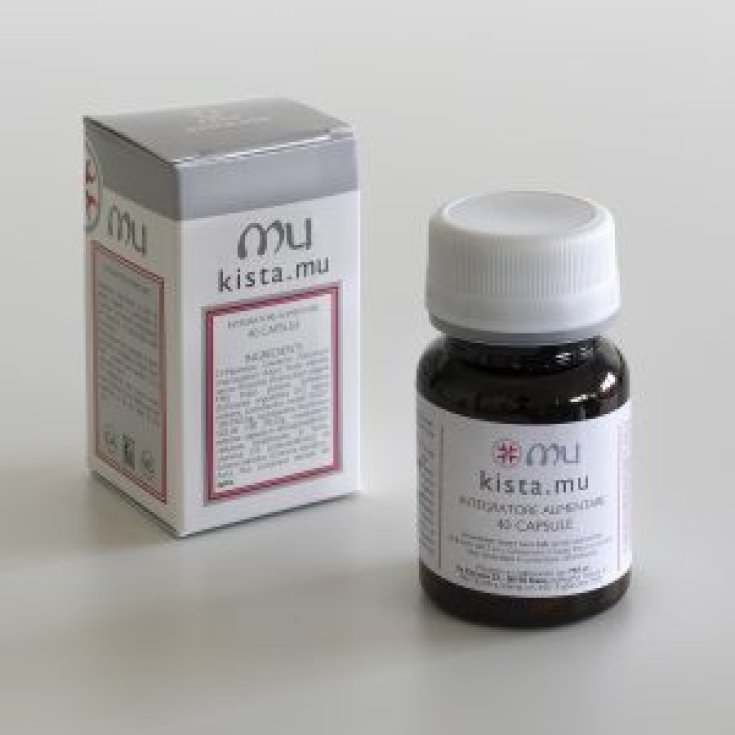kista.mu 40 Capsules

- Brand: MU Srl
- Product Code: 982544443
- EAN:
- Availability: In Stock
- Purchase 3 items for 24.21€ each
- Purchase 4 items for 23.71€ each
- Purchase 5 items for 23.22€ each
kista.mu Food Supplement
CYSTITIS - RECURRING CYSTITIS
RECIDIVING CYSTITIS
URINARY INFLAMMATION
Cystitis is an inflammation of the bladder mucosa caused mostly by facultative anaerobic bacteria which by contiguity come from the intestinal bacterial flora. Among these bacteria, the most common and known, responsible for most infections, is undoubtedly Escherichia coli which presents on its surface some filamentous appendages called fimbriae or pili which look like tentacles. At the end of these structures there are protein molecules, adhesins or lectins that allow bacteria to adhere to the epithelial cells present on the bladder mucosa and induce inflammation.
COMPOSITION
The daily dose of 2000 mg, equivalent to 4 capsules, contains: Mannose - 480 mg powder
Vaccinium macrocarpon (cranberry) - fruit 320 mg
Foeniculum vulgare (fennel) - fruit 160 mg
Echinacea angustifolia (echinacea) - roots 160 mg
Sodium bicarbonate 158.40 mg
Vitamin D3 1,6mcg Lactobacillus reuteri 4 bln Lactobacillus rhamnosus 4 bln Outer shell: capsule in hydroxypropylmethylcellulose
OWNERSHIP OF COMPONENTS
Mannose
D-mannose is a monosaccharide isomer of glucose which, once ingested, is absorbed in the upper intestine, is not metabolized, nor transformed into glycogen, nor stored in the liver. Poorly absorbed by the body, after being taken orally it arrives unaltered in the urinary tract where it first binds to the walls and the bacterium, then is expelled with the urine. The ability of bacteria to adhere to D-mannose is greater than the ability to bind to bladder cells, so D-mannose will be able to detach both bacteria already anchored to the mucosa and those that have penetrated deeply. Recent studies have also shown that D-mannose also binds to the toxins that bacteria produce to reach the inner mucosal layer where they nest. The D-mannose then connects to the lectins preventing binding to the bladder cells. Once combined with D-mannose, the bacteria can no longer adhere to the bladder and are eliminated through urination. The product is an alternative to antibiotic treatment when this appears to be unsolvable. It is also effective in the prevention of chronic relapsing cystitis.
Vaccinium macrocarpon
Cranberry or American cranberry was used in the past to treat kidney stones and other urinary problems and for the prevention of scurvy, thanks to its vitamin C content. Cranberry is currently used for the treatment of type 2 diabetes and syndrome of chronic fatigue, as well as being used as a diuretic, antiseptic and antipyretic. It is particularly indicated in acute recurrent infections of the urinary tract because it effectively completes the effect of D-mannose by having a very strong inhibitory activity against "mannose-resistant" adhesins.
Foeniculum vulgare
Fennel is an excellent source of vitamins (A, B and C), dietary fiber and many mineral salts (molybdenum, manganese, phosphorus, iron, calcium, potassium, copper, magnesium). It has strong antioxidant activity, helps control cholesterol, has diuretic, draining and digestive properties. It has a notable anti-inflammatory effect useful in the prevention and therapy of intestinal diseases.
Echinacea angustifolia
The medicinal properties of echinacea stimulate and strengthen the immune system, especially against colds, but also bacteriostatic, virustatic and anti-inflammatory. For external use, echinacea has skin-purifying, anti-wrinkle and anti-stretch mark functions, toning the microcirculation and the entire venous circulation.
Sodium bicarbonate
The bacteria that cause urinary tract infections live, grow and multiply in a weakly acidic environment. For this reason, the alkalizing function of bicarbonate on the urine is useful in an antibacterial function.
Vitamin D3
Vitamin D performs important functions for the body. It promotes the intestinal and renal absorption of calcium, an essential mineral for proper mineralization and for maintaining the compactness and health of bones and teeth. To these functions have been added others that have given a new image of vitamin D. These include the anti-inflammatory action, the stimulus to correct blood clotting and the modulation of the immune system.
Lactobacillus reuteri and lactobacillus rhamnosus
The vaginal flora plays a fundamental role in the prevention of urinary tract infections. Under normal conditions it is rich in lactobacilli which perform the barrier function and make the vaginal environment less favorable to the proliferation of pathogenic bacteria by inhibiting their adhesion to the mucosa. The alteration of the vaginal flora predisposes the urinary tract to the onset of infections. Antibiotic therapies alter the vaginal flora. Furthermore, in menopausal women, the reduced levels of estrogen make the concentration of lactobacilli insufficient. Integration with lactobacillus rhamnosus GR-1 and lactobacillus reuteri RC-14 has proven to be a very effective means of restoring vaginal flora and reducing the risk of urinary tract infections.
METHOD OF USE
2 capsules, with a little water, in the morning after urinating;
2 capsules, with little water, in the evening after urinating.
DOSAGE
D-mannose acts by contact and therefore the longer the time this contact occurs, the better the effects of the therapy will be. To increase the contact time between the substance and the mucosa, it will be advisable to drink little to urinate little and take two capsules in the evening after urinating and two capsules in the morning, always after urinating. Therapy after an acute event must be followed for at least one month and up to three months in a row, in relation to the extent and recurrence of the inflammation. As a prophylaxis, the same dosage is recommended (two capsules in the evening and two capsules in the morning) for one week a month or 2 days a week for 6-12 months.
CONTRAINDICATIONS AND SIDE EFFECTS
Even if the substances contained in the supplement have no specific contraindications in pregnancy and lactation, therefore they do not have negative effects on mother and fetus, it is advisable to use the supplement in these cases only on specific indications from the therapist. However, its use under three years of age is not recommended. Urine alkalinization can interfere with the rate of renal excretion of some drugs. Furthermore, some substances present in the supplement can alter the metabolism of some liver enzymes involved in the breakdown of warfarin. So, if you are taking any other medications, especially anticoagulants, you should consult with your doctor.
FORMAT
Pack of 40 capsules.

